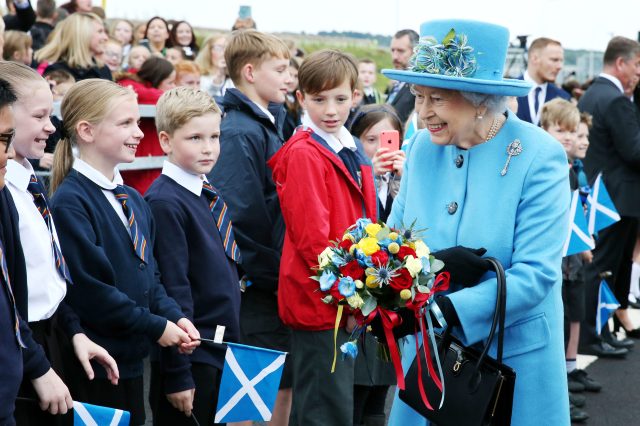The Queen meets pupils in Edinburgh. Credit: ANDREW MILLIGAN/AFP via Getty Images

We Scots are fond of telling ourselves we’re different, special even. There’s no welcome warmer, no people more generous, no country more beautiful. But — like Arthur Seaton that great anti-hero of Alan Sillitoe’s Saturday Night and Sunday Morning — we don’t take kindly to others describing us to ourselves: whatever people think we are or say we are, that’s what we’re not, because they don’t know a bloody thing about us.
For all our chippiness and our tendency towards Scottish exceptionalism (I dare you to buy a 73-year-old Scotsman a pint and ask him to list the achievements of our scientists and inventors) we’re not, I daresay, so very different from our neighbours south of the border. Just as is the case in England, Scottish society is built on a bedrock of small-c conservatism. The majority of us are not the radicals of contemporary myth but traditionalists, suspicious of sudden change.
And so it is not entirely surprising that a majority of Scots remain, for now, in favour of the Monarchy.
The Queen, if not every member of her family, retains the respect of most Scots. Crowds may be depended upon to appear whenever she is north of the border. When she is in residence at Balmoral, the route to Crathie Kirk in nearby Ballater will be lined with locals who see her as one of their own. A publicised visit to Holyrood Palace at the foot of Edinburgh’s Royal Mile provokes similar interest, with tourists and locals alike gathering in the hope that they might catch a glimpse of the monarch.
It helps that the Queen has never been backward about describing her love of Scotland. Visiting the Scottish Parliament to mark its 20th anniversary in June of this year, she described her “great affection” for Scotland and spoke of “the many happy and personal connections I enjoy with this wonderful country.”
It is safe to say that among those listening to Her Majesty from the cheap seats that day were MSPs — particularly those from the SNP, the Labour Party, and the Greens — who do not reciprocate these feelings. There is a strong vein of republicanism running through Scottish political life. It is only the caution of mainstream political leaders which prevents much discussion about the matter. The findings of UnHerd’s survey, showing that Scots are not as enthusiastic about the continuation of the monarchy as our neighbours south of the border, will come as encouraging news to many elected members.
Back in 2004, when Alex Salmond returned to the leadership of the SNP for a second stint, he and his team created a new story of Scottish nationalism. Out went the Braveheart rhetoric and in came a more widely palatable narrative. Basically, everything would change with independence but it would also, somehow, stay the same. The radical break up of the United Kingdom would not seem like the nationalists overturning centuries of tradition.
Crucial to this story was Salmond’s effusive support for the monarchy. He spoke enthusiastically about the Queen’s role in an independent Scotland; she would, he said, be proud to be its monarch.
Scotland is changing, and quickly. Politicians have long since abandoned the pretence that theirs is a battle between Right and Left. Rather, the fight now is between two visions (or fantasies, depending on your taste for populism) of how the country might be. For the (slender) majority of Scots, the country’s future is more secure as part of the Union. For nationalists, nipping at the heels of Unionists, a radical shake-up is required.
Cautious senior figures in the SNP will continue to publicly support the monarchy. The future of the monarchy, one tells me, is not a discussion worth risking right now. But the results of the survey — which show approval and disapproval of the monarchy equally split in some areas of the country — might reveal the existence of a ticking time bomb.
Not so very long ago, you could say with certainty that the vast majority of Scots would continue to vote Labour until the day they died. Now, the party languishes behind the SNP and the Conservatives in the polls. Nothing is set in stone.
Scotland may not yet be ready to discuss the abolition of the monarchy but with radical voices urging the SNP to be bolder in its approach to breaking up the union, it would be unsurprising to hear more republican voices emerge in our national debate. Should Scotland become independent, a debate on the future of the monarchy would be unavoidable.
One veteran SNP politician tells me that the outcome of that discussion may hinge on who is at the head of “the firm” at such a time:
“Nobody at the top of the party is going to agitate to get rid of the Queen. But if someone else is in charge, there may be a debate to be had in an independent Scotland.”
There might not yet be an insatiable appetite among Scots to ditch the monarchy but, as the findings of the UnHerd survey show, the Royals are endured rather than admired by a great many of us.










Join the discussion
Join like minded readers that support our journalism by becoming a paid subscriber
To join the discussion in the comments, become a paid subscriber.
Join like minded readers that support our journalism, read unlimited articles and enjoy other subscriber-only benefits.
Subscribe